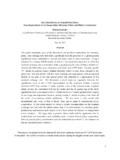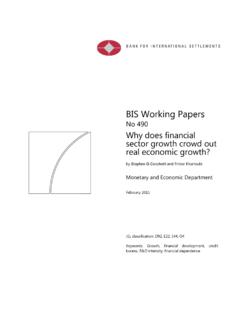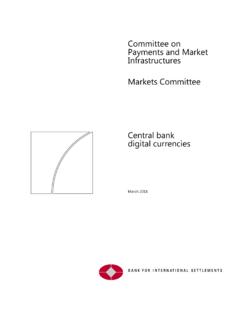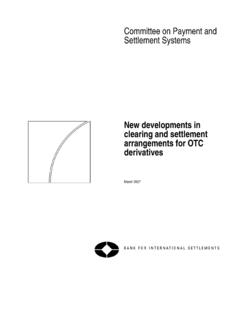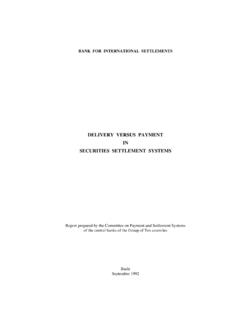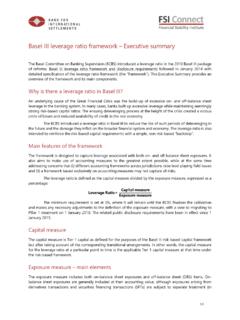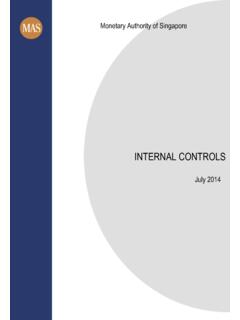Transcription of Basel Committee on Banking Supervision
1 Basel Committee on Banking Supervision Principles for Operational Resilience March 2021 This publication is available on the BIS website ( ). Bank for International Settlements 2021. All rights reserved. Brief excerpts may be reproduced or translated provided the source is stated. ISBN 978-92-9259-467-1 (online) Principles for Operational Resilience iii Contents Principles for operational resilience .. 1 I. Introduction .. 1 II. An evolving operational risk landscape .. 1 III. Essential elements of operational resilience .. 2 IV. Definition of operational resilience .. 3 V. Operational resilience principles .. 3 Governance .. 4 Operational risk management .. 4 Business continuity planning and testing.
2 5 Mapping interconnections and interdependencies .. 6 Third-party dependency management .. 6 Incident management .. 7 ICT including cyber security .. 7 Principles for Operational Resilience 1 Principles for operational resilience I. Introduction 1. In the years that followed the Great Financial Crisis (GFC) of 2007 09, the Basel Committee s reforms of its prudential framework have enhanced the Supervision of the global Banking system and resulted in a number of structural changes to strengthen banks financial resilience. While significantly higher levels of capital and liquidity have improved banks ability to absorb financial shocks, the Committee believes that further work is necessary to strengthen banks ability to absorb operational risk-related events, such as pandemics, cyber incidents, technology failures and natural disasters, which could cause significant operational failures or wide-scale disruptions in financial markets.
3 In light of the critical role that banks play in the operation of the global financial infrastructure, increasing their resilience would provide additional safeguards to the financial system. 2. Even prior to the Covid-19 pandemic, the Committee considered that significant operational disruptions would inevitably test improvements to the financial system s resilience made since the GFC. As the Covid-19 pandemic progressed, the Committee observed banks rapidly adapting their operational posture in response to new hazards or changes in existing hazards that occurred in different parts of their organisation. Recognising that a range of potential hazards cannot be prevented, the Committe e believes that a pragmatic, flexible approach to operational resilience can enhance the ability of banks to withstand, adapt to and recover from potential hazards and thereby mitigate potentially severe adverse impacts.
4 3. Through the publication of this document, the Committee seeks to promote a principles-based approach to improving operational resilience. The approach builds on updates to the Committee s Principles for the Sound Management of Operational Risk (PSMOR)1 and draws from previously issued principles on corporate governance for banks, as well as outsourcing-, business continuity- and relevant risk management-related guidance. 4. Recognising the work undertaken by several jurisdictions and standard-setting bodies (SSBs) to bolster the operational resilience of the financial sector,2 the Committee aims to strengthen operational resilience by furthering international engagement and seeks to promote greater cross-sectoral collaboration over this body of work.
5 II. An evolving operational risk landscape 5. Banks and their customers have benefited from the application of technology to financial services, although the increased use of technology presents new risks. Until recently, some of the most predominant operational risks that banks faced resulted from vulnerabilities related to the rapid adoption of and increased dependency on technology infrastructure for the provision of financial services and intermediation, as well as the sector s growing reliance on technology-based services provided by third 1 Revisions to the Principles for the Sound Management of Operational Risk, March 2021, 2 Bank of England and Financial Conduct authority , Building the UK financial sector's operational resilience, December 2019; European Banking authority , EBA guidelines on ICT and security risk management, November 2019.
6 European Commission, Legislative proposal for an EU regulatory framework on digital operational resilience for the financial sector (DORA), September 2020; monetary authority of singapore , Ensuring safe management and operational resilience of the financial sector, April 2020: International Organization of Securities Commissions (IOSCO), Principles on outsourcing, May 2020; and Board of Governors of the Federal Reserve System, Federal Deposit Insurance Corporation and Office of the Comptroller of the Currency, Sound Practices to Strengthen Operational Resilience, October 2020. 2 Principles for Operational Resilience parties. The Covid-19 pandemic has exacerbated these operational risks and increased economic and business uncertainty.
7 Technology and relationships with third parties have at the same time supported the continued delivery of products and services to customers and promoted the ability of banks to continue operations during the pandemic. 6. Pandemic-related disruptions have affected information systems, personnel, facilities and relationships with third-party service providers and customers. In addition, cyber threats (ransomware attacks, phishing, etc) have spiked, and the potential for operational risk events caused by people, failed processes and systems has increased as a result of greater reliance on virtual working arrangements. The Committee s guidance on operational resilience will continue to be informed by its monitoring of the impact of the Covid-19 pandemic and any lessons learned.
8 III. Essential elements of operational resilience 7. Operational resilience is an outcome that benefits from the effective management of operational Activities such as risk identification and assessment, risk mitigation (including the implementation of controls) and the monitoring of risks and control effectiveness work together to minimise operational disruptions and their effects. In addition, management s focus on the bank s ability to respond to and recover from disruptions, assuming failures will occur, will support operational resilience. An operationally resilient bank is less prone to incur untimely lapses in its operations and losses from disruptions, thus lessening incident impact on critical operations and related services, functions and systems.
9 While it may not be possible to avoid certain operational risks, such as a pandemic, it is possible to improve the resilience of a bank s operations to such events. 8. In addition, business continuity, outsourcing of services to third parties and the technology upon which banks rely are important factors for banks to consider when strengthening their operational resilience. Previously issued guidance in these areas, whether issued solely by the Committee4 or jointly with other SSBs,5 does not adequately capture all essential elements when considered on a standalone basis, but does advance operational resilience when considered collectively. 9. It is essential for banks to ensure that existing risk management frameworks, business continuity plans and third-party dependency management are implemented consistently within the organisation.
10 Banks should consider whether their operational resilience approach is appropriately harmonised with the stated actions, organisational mappings, and definitions of critical functions and critical shared services contained in their recovery and resolution plans as specified in the Financial Stability Board s (FSB s) Recovery and Resolution Planning framework, as 10. The principles for operational resilience set forth in this document are largely derived and adapted from existing guidance that has been issued by the Committee or national supervisors over a number of years. The Committee recognises that many banks have well established risk management 3 BCBS, Revisions to the Principles for the Sound Management of Operational Risk, March 2021.
